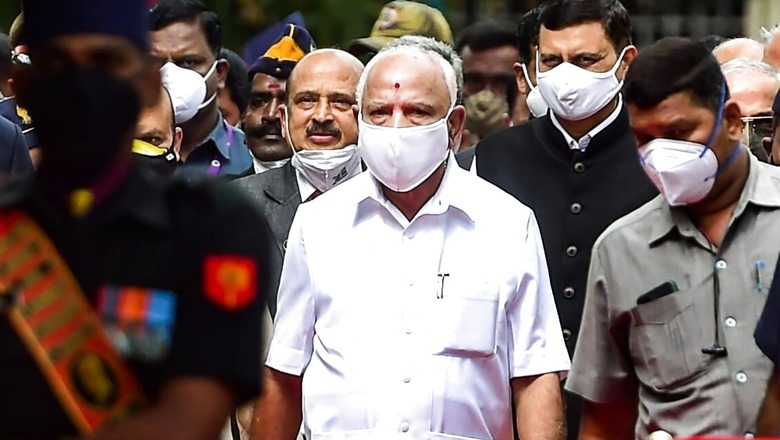
views
Karnataka Chief Minister BS Yediyurappa announced his resignation on Monday, ending days of speculation over his imminent exit.
The 78-year-old Lingayat strongman whose exit was protested against by powerful seers in the state and even opposition leaders started his career as a clerk in the social welfare department.
A hardboiled RSS swayamsevak, Bookanakere Siddalingappa Yediyurappa joined the Hindu right organisation when he was 15, and cut his political teeth in the Jana Sangh, the BJP’s forerunner, in his hometown Shikaripura in Shivamogga district.
He became Jana Sangh’s Shikaripura taluk chief in the early 1970s.
Yediyurappa, who began his electoral politics as Purasabha president in Shikaripura, was first elected to the Assembly from Shikaripura in 1983 and went on to win eight times from there.
End of an era. @BSYBJP was from a poor family. Lost mother when he was a child. Sold lemons to help family. Worked as a factory helper and a rice mill clerk. Built BJP in Karnataka &brought it to power. 8 time MLA, one time MP&MLC. Thrice Leader of the Opposition. Four time CM.— DP SATISH (@dp_satish) July 26, 2021
Along with being party’s state unit president, he has also served as opposition Leader in the Legislative Assembly, member of Legislative Council, as also member of Parliament.
A Bachelor of Arts, Yediyurappa, who was jailed during Emergency, worked as a clerk in the social welfare department before taking up a similar job at a rice mill in his native Shikaripura before he set up his hardware shop in Shivamogga.
He married Maitradevi, daughter of the rice mill owner, where he worked, on March 5, 1967 and has two sons and three daughters.
Yediyurappa may have landed in the hot seat in 2004 when the BJP emerged as the single largest party, but the Congress and JD(S) of former Prime Minister H D Deve Gowda allied, and a government was formed under Dharam Singh.
Known for his political acumen, Yediyurappa joined hands with Kumaraswamy, Deve Gowda’s son, in 2006 and brought down the Dharam Singh government after the Chief Minister was indicted by Lokayukta in an alleged mining scam.
Under a rotational chief ministership arrangement, Kumaraswamy became the CM and Yediyurappa his deputy.
Yediyurappa became CM for the first time in November 2007 but his term lasted just seven days as Kumaraswamy reneged on a power sharing pact and walked out of the alliance.
In the 2008 polls, Yediyurappa led the party to victory, and the first BJP government in Southern India was formed under him.
Soon controversies swirled around Yediyurappa over alleged abuse of office to favour his sons in allotment of land
in Bengaluru, he was forced to resign on July 31, 2011 following indictment by Lokayukta in an illegal mining scam.
On October 15 that year, he surrendered before the Lokayukta court after it issued a warrant against him in connection with alleged land scams and was in jail for a week.
After quitting, Yediyurappa broke his decades-long association with the saffron party and formed the Karnataka Janata Paksha.
However, ploughing a lonely furrow, he failed to make the KJP a force to reckon with in state politics but wrecked the BJP’s chances of retaining power in the 2013 polls, winning six seats and polling about 10 per cent votes.
As Yediyurappa faced an uncertain future and the BJP looked for a leader with a formidable reputation to lend its campaign the required heft ahead of the 2014 Lok Sabha polls, the two regrouped, leading to the KCP’s merger with the BJP on January 9, 2014.
In the Lok Sabha election, the BJP won 19 of the state’s 28 seats, a remarkable turnaround for the party which had secured only 19.9 per cent votes in the Assembly polls just a year ago leading to the fall of its first government.
On October 26, 2016, he got a huge relief when a special CBI court acquitted him, his two sons and son-in-law in a Rs 40 crore illegal mining case, which had cost him the chief ministership in 2011.
In January 2016, the Karnataka High Court quashed all 15 FIRs against Yediyurappa lodged by Lokayukta police under the Prevention of Corruption Act. In April that year, he was appointed the state BJP chief for the fourth time.
The Lingayat leader, however, continued to be dogged by controversies, with the anti-corruption bureau launching proceedings against him in an alleged illegal land denotification case, which was stayed by the High Court following his plea.
The BJP declared him its chief ministerial candidate in the 2018 assembly polls, ignoring the taunts by the Congress.
As the polls threw up a hung verdict, with no party getting a clear majority in the 225-member House (including Speaker), the Governor invited Yediyurappa to form the government and gave him 15 days to prove the majority.
However,the Supreme Court asked him to prove the majority in the House following a plea by the Congress-JDS challenging the governor’s decision to invite the BJP to form government.
The three-day-old BJP government collapsed on May 19, minutes before the scheduled trust vote, with him resigning in a tame anti-climax and hours later Kumaraswamy, the chief ministerial candidate of the newly formed JD(S)-Congress alliance, was invited to form the government.
Read all the Latest News, Breaking News and Coronavirus News here.















Comments
0 comment